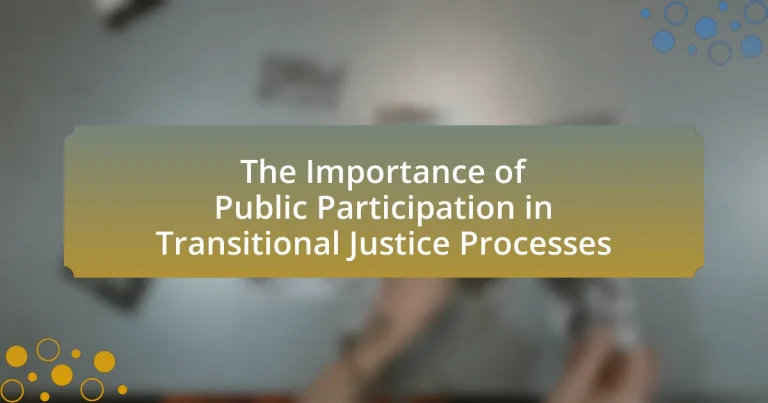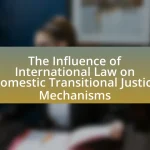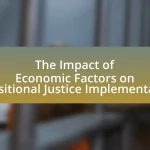Public participation is a fundamental aspect of transitional justice processes, as it enhances legitimacy, accountability, and social cohesion. Engaging communities ensures that diverse perspectives are included, reflecting the needs of those affected by conflict or repression. The article examines the role of public participation in fostering accountability and legitimacy, highlighting key principles such as inclusivity and transparency. It also discusses mechanisms that facilitate effective engagement, the challenges faced, and best practices for enhancing public involvement in transitional justice initiatives, drawing on successful case studies like South Africa’s Truth and Reconciliation Commission.
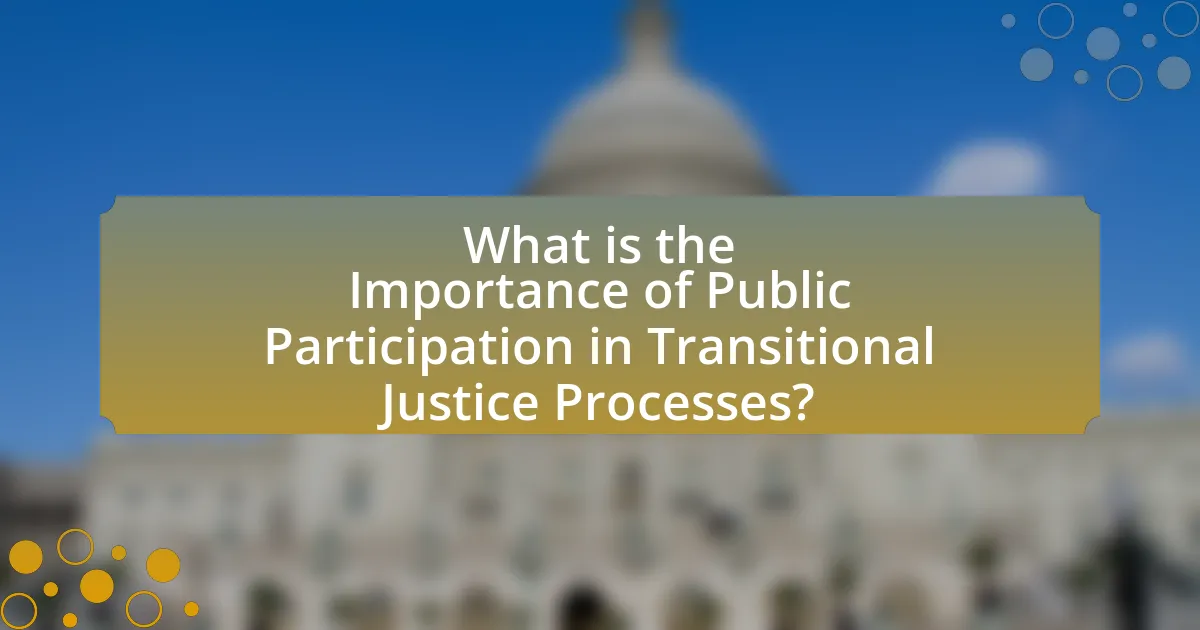
What is the Importance of Public Participation in Transitional Justice Processes?
Public participation is crucial in transitional justice processes as it fosters legitimacy, accountability, and social cohesion. Engaging communities allows for diverse perspectives to be included, ensuring that the justice mechanisms reflect the needs and experiences of those affected by conflict or repression. For instance, the Truth and Reconciliation Commission in South Africa demonstrated that public involvement helped to address grievances and promote healing, thereby enhancing the overall effectiveness of the transitional justice framework. Furthermore, studies indicate that when communities actively participate, there is a higher likelihood of sustainable peace and reconciliation, as seen in various post-conflict societies where inclusive processes have led to more durable outcomes.
Why is public participation crucial in transitional justice?
Public participation is crucial in transitional justice because it fosters legitimacy, accountability, and inclusivity in the processes aimed at addressing past human rights violations. Engaging the public ensures that the voices of victims and affected communities are heard, which enhances the relevance and effectiveness of justice mechanisms. For instance, the Truth and Reconciliation Commission in South Africa demonstrated that public involvement led to a more comprehensive understanding of the apartheid era’s atrocities, thereby facilitating healing and societal reconciliation. Additionally, studies show that when communities actively participate, there is a higher likelihood of sustained peace and reduced recurrence of violence, as seen in various post-conflict societies.
What role does public participation play in fostering accountability?
Public participation plays a crucial role in fostering accountability by enabling citizens to engage in decision-making processes and hold authorities accountable for their actions. When individuals actively participate, they contribute to transparency and oversight, which are essential for ensuring that government and institutional actions align with public interests. For instance, studies have shown that in transitional justice processes, such as those in South Africa and Rwanda, public involvement has led to greater scrutiny of human rights violations and enhanced the legitimacy of accountability mechanisms. This engagement not only empowers communities but also creates a culture of accountability where officials are more likely to act responsibly due to the presence of an informed and active citizenry.
How does public participation enhance the legitimacy of transitional justice mechanisms?
Public participation enhances the legitimacy of transitional justice mechanisms by fostering inclusivity and ensuring that diverse perspectives are represented in the process. When communities are actively involved, they contribute to a sense of ownership over the justice mechanisms, which increases public trust and acceptance. For instance, studies have shown that when victims and affected communities engage in truth commissions or reparations programs, the outcomes are more likely to reflect the needs and experiences of those directly impacted, thereby reinforcing the perceived fairness and effectiveness of the mechanisms. This participatory approach not only legitimizes the processes but also promotes accountability and transparency, essential elements for sustainable peace and reconciliation.
What are the key principles of public participation in transitional justice?
The key principles of public participation in transitional justice include inclusivity, transparency, accountability, and empowerment. Inclusivity ensures that diverse voices, particularly marginalized groups, are represented in the process, fostering a comprehensive understanding of the societal impacts of past injustices. Transparency involves open communication about the processes and decisions, allowing the public to understand how their input shapes outcomes. Accountability requires that authorities and institutions are answerable to the public for their actions and decisions, reinforcing trust in the transitional justice mechanisms. Empowerment focuses on enabling communities to actively engage in the justice process, thereby enhancing their agency and ownership over the outcomes. These principles are essential for building legitimacy and fostering reconciliation in societies emerging from conflict or authoritarian rule.
How do inclusivity and representation impact transitional justice outcomes?
Inclusivity and representation significantly enhance transitional justice outcomes by ensuring that diverse perspectives are considered, which fosters legitimacy and public trust in the processes. When marginalized groups, such as victims of conflict or discrimination, are actively involved in transitional justice mechanisms, the resulting policies and actions are more likely to address their specific needs and grievances. For instance, the Truth and Reconciliation Commission in South Africa included various stakeholders, which helped to create a more comprehensive understanding of the past and facilitated broader societal healing. Research indicates that inclusive processes lead to higher rates of compliance with transitional justice measures, as seen in countries like Rwanda, where community involvement in justice initiatives contributed to a reduction in recidivism and improved social cohesion.
What mechanisms facilitate effective public participation in these processes?
Effective public participation in transitional justice processes is facilitated by mechanisms such as inclusive dialogue platforms, transparent communication channels, and community engagement initiatives. Inclusive dialogue platforms allow diverse stakeholders, including victims and marginalized groups, to voice their concerns and contribute to decision-making. Transparent communication channels ensure that information regarding processes and outcomes is readily accessible, fostering trust and accountability. Community engagement initiatives, such as workshops and public forums, actively involve citizens in discussions, enhancing their sense of ownership and investment in the justice process. These mechanisms collectively promote a participatory environment that is essential for the legitimacy and effectiveness of transitional justice efforts.
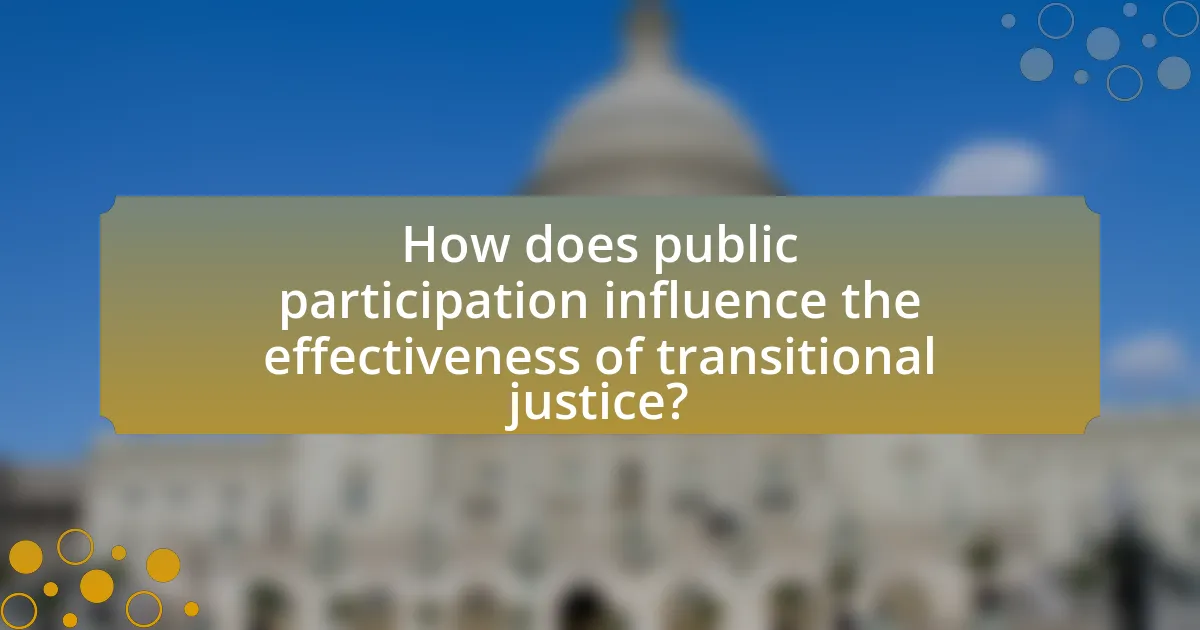
How does public participation influence the effectiveness of transitional justice?
Public participation significantly enhances the effectiveness of transitional justice by fostering legitimacy, accountability, and community ownership of the processes. When communities are actively involved, they contribute local knowledge and perspectives that shape more relevant and culturally sensitive justice mechanisms. For instance, the Truth and Reconciliation Commission in South Africa demonstrated that public hearings allowed victims to share their experiences, which not only validated their suffering but also informed the broader narrative of the nation’s history. This engagement led to greater public trust in the outcomes and increased compliance with the recommendations made by the Commission. Furthermore, studies indicate that inclusive processes can lead to more sustainable peace, as they address the root causes of conflict and promote social cohesion, evidenced by the successful integration of community-led initiatives in post-conflict societies like Rwanda.
What are the potential outcomes of increased public involvement?
Increased public involvement in transitional justice processes can lead to enhanced legitimacy and effectiveness of these initiatives. When communities actively participate, they contribute diverse perspectives that can inform policies and practices, ensuring they are more representative of societal needs. Research indicates that public engagement fosters trust in institutions; for instance, a study by the United Nations Development Programme found that inclusive processes can significantly improve public confidence in justice systems. Additionally, increased involvement can facilitate healing and reconciliation, as communities feel their voices are heard and valued, which is crucial in post-conflict settings.
How can public participation lead to more comprehensive truth-telling?
Public participation can lead to more comprehensive truth-telling by incorporating diverse perspectives and experiences into the narrative of historical events. When communities engage in the truth-telling process, they contribute unique insights that reflect the complexities of their experiences, which enhances the overall understanding of the truth. For instance, the South African Truth and Reconciliation Commission demonstrated that involving victims and communities in testimonies revealed a broader spectrum of human rights violations, thereby creating a more nuanced historical account. This participatory approach not only validates individual experiences but also fosters collective memory, ensuring that multiple voices are heard and acknowledged in the pursuit of justice.
What impact does public engagement have on reparations and justice delivery?
Public engagement significantly enhances reparations and justice delivery by fostering transparency, accountability, and community trust. When communities actively participate in discussions about reparations, they can articulate their needs and experiences, which leads to more tailored and effective justice solutions. For instance, the Truth and Reconciliation Commission in South Africa demonstrated that public involvement in the reparations process helped to address historical grievances and promote healing, ultimately contributing to a more inclusive society. Engaging the public also ensures that the reparations process is not only a top-down initiative but reflects the voices and concerns of those directly affected, thereby increasing the legitimacy and acceptance of justice outcomes.
What challenges exist in promoting public participation in transitional justice?
Promoting public participation in transitional justice faces several challenges, including lack of trust in institutions, limited access to information, and socio-political barriers. Trust issues arise when communities perceive transitional justice mechanisms as biased or ineffective, which can discourage engagement. Limited access to information prevents individuals from understanding their rights and the processes involved, leading to apathy or misinformation. Socio-political barriers, such as ongoing conflict or repression, can further inhibit participation by creating an environment where individuals fear repercussions for their involvement. These challenges are documented in various studies, including the United Nations Development Programme’s report on transitional justice, which highlights the importance of addressing these obstacles to foster meaningful public engagement.
How do power dynamics affect public participation in these processes?
Power dynamics significantly influence public participation in transitional justice processes by determining who has a voice and whose interests are prioritized. In contexts where power is concentrated among elites or specific groups, marginalized communities often face barriers to participation, leading to a lack of representation in decision-making. For instance, research by the International Center for Transitional Justice highlights that when power imbalances exist, the perspectives of victims and affected communities are frequently overlooked, undermining the legitimacy and effectiveness of transitional justice initiatives. This exclusion can perpetuate cycles of injustice and hinder societal healing, as the processes fail to address the needs and rights of all stakeholders involved.
What barriers hinder effective public engagement in transitional justice?
Barriers that hinder effective public engagement in transitional justice include lack of awareness, mistrust in institutions, and socio-political dynamics. Lack of awareness prevents communities from understanding their rights and the transitional justice processes available to them, which is critical for meaningful participation. Mistrust in institutions arises from historical grievances and perceived biases, leading to skepticism about the intentions and effectiveness of transitional justice mechanisms. Additionally, socio-political dynamics, such as power imbalances and ongoing conflicts, can marginalize certain groups, further complicating their ability to engage. These barriers collectively undermine the potential for inclusive and effective public participation in transitional justice processes.
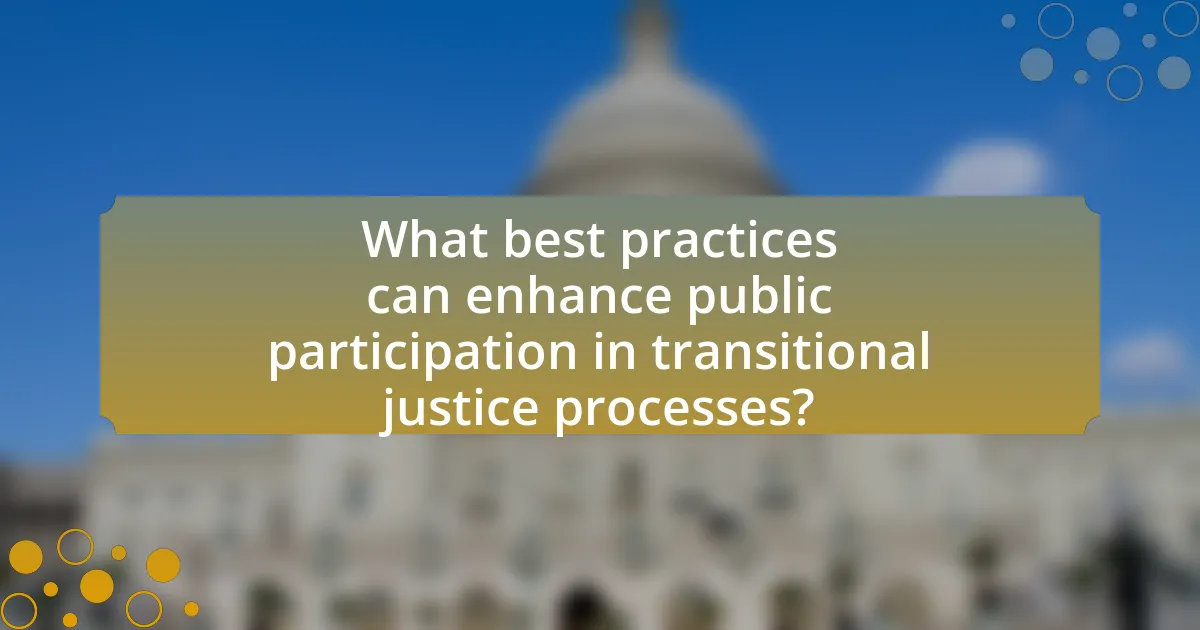
What best practices can enhance public participation in transitional justice processes?
Best practices that can enhance public participation in transitional justice processes include ensuring transparency, fostering inclusive dialogue, and utilizing technology for outreach. Transparency builds trust and encourages community engagement by allowing citizens to understand the processes and decisions being made. Inclusive dialogue involves actively seeking input from diverse groups, including marginalized communities, to ensure that all voices are heard and considered. Utilizing technology, such as social media and online platforms, can broaden outreach efforts, making it easier for the public to participate and share their perspectives. These practices are supported by various case studies, such as the South African Truth and Reconciliation Commission, which highlighted the importance of public involvement in achieving restorative justice and societal healing.
How can stakeholders ensure meaningful public engagement?
Stakeholders can ensure meaningful public engagement by actively involving community members in decision-making processes and providing accessible information. This approach fosters trust and encourages diverse perspectives, which are essential for effective transitional justice. Research indicates that inclusive engagement leads to better outcomes; for instance, a study by the United Nations Development Programme highlights that participatory processes enhance legitimacy and community ownership of justice initiatives. By prioritizing transparency and responsiveness, stakeholders can create an environment where public input is valued and integrated into policy development.
What strategies can be employed to educate the public about transitional justice?
To educate the public about transitional justice, strategies such as community engagement, educational programs, and media campaigns can be employed. Community engagement involves organizing workshops and forums where individuals can discuss and learn about transitional justice concepts, fostering a participatory environment. Educational programs in schools and universities can incorporate transitional justice into curricula, ensuring that younger generations understand its significance. Media campaigns utilizing social media, documentaries, and public service announcements can raise awareness and disseminate information widely, reaching diverse audiences. These strategies have been effective in various contexts, as seen in post-conflict societies where public understanding of transitional justice has led to greater community involvement and support for justice initiatives.
How can technology be leveraged to facilitate public participation?
Technology can be leveraged to facilitate public participation by utilizing digital platforms that enable real-time communication and feedback. These platforms, such as social media, online surveys, and dedicated websites, allow citizens to express their opinions, share experiences, and engage in discussions regarding transitional justice processes. For instance, a study by the United Nations Development Programme highlighted that online platforms increased public engagement by 40% in participatory budgeting initiatives, demonstrating the effectiveness of technology in enhancing civic involvement.
What lessons can be learned from successful public participation initiatives?
Successful public participation initiatives demonstrate the importance of inclusivity, transparency, and responsiveness in decision-making processes. These initiatives show that engaging diverse community members fosters trust and enhances the legitimacy of outcomes. For instance, the Truth and Reconciliation Commission in South Africa effectively involved victims and perpetrators, leading to a more comprehensive understanding of past injustices and promoting healing. Research indicates that when citizens feel their voices are heard, they are more likely to support and adhere to the resulting policies, as evidenced by the increased community engagement in post-conflict reconstruction efforts in countries like Rwanda.
What case studies exemplify effective public involvement in transitional justice?
Case studies that exemplify effective public involvement in transitional justice include South Africa’s Truth and Reconciliation Commission (TRC) and the Guatemalan Commission for Historical Clarification. The TRC, established in 1995, engaged the public through hearings that allowed victims to share their experiences, fostering national dialogue and reconciliation. This process resulted in over 2,000 testimonies and highlighted the importance of public participation in acknowledging past atrocities. Similarly, the Guatemalan Commission, formed in 1997, involved extensive community consultations and documented human rights violations during the civil war, leading to greater awareness and accountability. These case studies demonstrate how public involvement can enhance the legitimacy and effectiveness of transitional justice mechanisms.
How can these lessons be applied to future transitional justice efforts?
Lessons from past transitional justice efforts can be applied to future initiatives by prioritizing public participation to enhance legitimacy and effectiveness. Engaging communities in the design and implementation of justice processes fosters trust and ensures that the needs and perspectives of affected populations are addressed. For instance, the Truth and Reconciliation Commission in South Africa demonstrated that inclusive dialogue can facilitate healing and reconciliation, leading to more sustainable outcomes. Additionally, research indicates that when victims and communities are actively involved, the likelihood of successful implementation increases, as seen in the participatory approaches adopted in countries like Colombia. Thus, integrating public participation into transitional justice frameworks is essential for achieving meaningful and lasting justice.
What practical steps can individuals take to engage in transitional justice processes?
Individuals can engage in transitional justice processes by participating in community dialogues and public forums that address past injustices. These platforms allow individuals to voice their experiences and contribute to collective memory, which is essential for healing and reconciliation. Additionally, individuals can join or support local organizations that advocate for victims’ rights and promote accountability for perpetrators. Research indicates that public participation enhances the legitimacy and effectiveness of transitional justice mechanisms, as seen in countries like South Africa, where community involvement was crucial in the Truth and Reconciliation Commission’s success. By actively engaging in these ways, individuals help shape the narrative of justice and contribute to societal healing.
